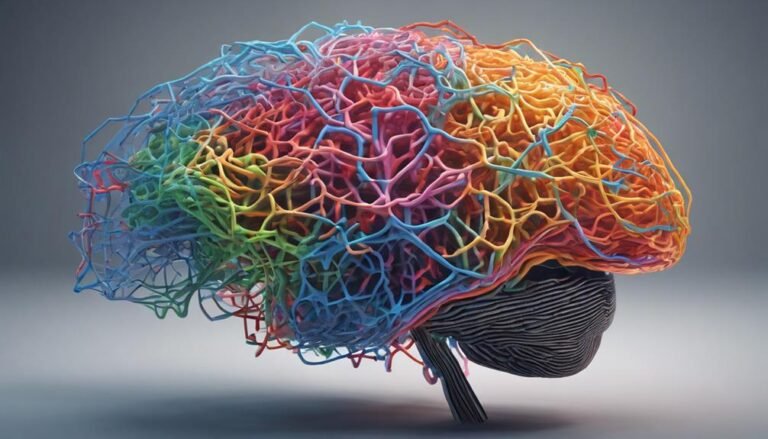Karen Horney’s Contributions to Personality Psychology
Step into the domain of personality psychology, where Karen Horney's theories act as a compass guiding us through the intricate labyrinth of human behavior. As you explore her innovative concepts on neurosis and coping mechanisms, you will uncover a treasure trove of insights into the complexities of personality development. Horney's unique perspective not only challenges established norms but also offers a fresh lens through which to view the intricacies of the human psyche. Through her work, she invites you to ponder the depths of human nature and set out on a journey toward greater self-understanding and personal growth.
Key Takeaways
- Introduced the concept of 'basic anxiety' linked to personality development.
- Proposed three coping strategies: moving towards, against, or away from others.
- Emphasized the impact of childhood experiences on personality.
- Challenged Freud's views on women, introducing 'womb envy'.
- Advocated for self-awareness, self-acceptance, and personal growth.
Early Life and Influences
Karen Horney's early life and influential experiences shaped the foundation of her groundbreaking contributions to personality psychology. Born in 1885 in Hamburg, Germany, Horney's childhood experiences played a pivotal role in her later theories. Raised in a strict household by a distant father, she developed a keen interest in psychoanalytic theory, particularly the work of Sigmund Freud. This early exposure to Freud's ideas set the stage for Horney's future critiques and developments within the field.
Horney's psychoanalytic background, including her training and work as a psychoanalyst, further influenced her perspectives on personality. Despite initially embracing Freudian theory, she later diverged from it, challenging many of its core concepts. Horney's focus on cultural and social factors in shaping personality, in contrast to Freud's emphasis on biological and instinctual drives, marked a significant departure from traditional psychoanalytic thought.
Through her innovative ideas and research, Horney made lasting contributions to the field of personality psychology.
Critique of Freudian Theories
You'll examine Karen Horney's critique of Freudian theories and her alternative perspectives in this section.
Horney challenged Freud's emphasis on biological determinism and the centrality of penis envy in women's development.
Instead, she proposed that cultural and societal factors influence personality development to a greater extent than Freud acknowledged.
Freudian Theory Critique
Critiquing Freudian theories reveals significant limitations in their explanatory power and relevance in understanding personality dynamics. While Freud's work made foundational contributions to psychology, his theories have faced scrutiny, particularly from feminist psychology perspectives and cultural influences.
From a feminist psychology standpoint, Freud's emphasis on innate biological drives and the concept of penis envy perpetuated gender stereotypes and failed to take into account the impact of societal structures on personality development. Additionally, Freud's theories often focused on the experiences of white, middle-class individuals, neglecting the diversity of cultural influences on personality formation.
Furthermore, Freud's heavy reliance on early childhood experiences and the Oedipus complex as determinants of adult personality has been criticized for oversimplifying the complexities of human development. The exclusive emphasis on unconscious sexual and aggressive drives in Freudian theory neglects the role of social interactions, individual agency, and the influence of broader social contexts on personality dynamics.
Horney's Alternative Perspectives
Challenging traditional Freudian theories, Horney's alternative perspectives offer a critical reevaluation of personality dynamics and development. Horney's psychoanalytic critique focused on the limitations of Freud's theories, particularly in understanding women's psychology. Her feminist perspectives emphasized the importance of considering societal influences on personality formation, highlighting the impact of gender roles as social constructs.
Horney's work diverged from Freud by rejecting the concept of penis envy and the idea that women's development is solely defined by their relationship to men. Instead, she proposed that women's struggles stemmed from societal pressures and restrictive gender norms. By shifting the focus towards cultural and environmental factors, Horney broadened the scope of personality psychology and challenged the male-centric views prevalent in Freudian theory.
Basic Anxiety and Neurosis
You'll explore Karen Horney's concept of basic anxiety and its connection to the development of neurosis. Understanding how Horney's theory views basic anxiety as a pervasive sense of isolation and helplessness can shed light on the origins of neurotic behaviors.
Horney's Theory Overview
Horney's theory of personality, centered around the concepts of basic anxiety and neurosis, provides a foundational understanding of the internal struggles individuals may face in their psychological development. In her psychoanalytic approach to personality development, Horney emphasized the impact of childhood experiences on shaping an individual's personality.
According to her theory, basic anxiety stems from feelings of isolation and helplessness experienced during childhood, leading individuals to develop coping mechanisms that shape their interpersonal relationships and overall psychological well-being.
Horney proposed that neurosis arises as a result of maladaptive psychological defense mechanisms individuals employ to cope with the underlying basic anxiety. These defense mechanisms, such as moving towards others (compliance), moving against others (aggression), or moving away from others (detachment), become ingrained patterns that influence how individuals interact with others and navigate the world around them.
Impact on Psychology
The concept of basic anxiety and neurosis introduced by Karen Horney has greatly influenced the field of psychology, shedding light on the underlying emotional struggles individuals may experience in their development. Horney's theory has significant research implications, prompting further exploration into the impact of childhood experiences on adult personality and mental health.
By emphasizing the role of societal and interpersonal factors in shaping personality, Horney's work has spurred psychological theories that consider the influence of social relationships on emotional well-being.
Horney's academic contributions have sparked a wealth of psychological research aimed at understanding the mechanisms underlying neurosis and anxiety disorders. Her emphasis on the role of childhood experiences in the development of neurotic tendencies has informed therapeutic approaches that seek to address underlying emotional conflicts.
Additionally, Horney's insights have advanced the field of psychology by highlighting the importance of considering individual differences in coping with basic anxiety, leading to more personalized and effective treatment strategies for mental health disorders.
Three Coping Strategies
Exploring Karen Horney's work in personality psychology reveals three primary coping strategies that individuals utilize in response to perceived threats and challenges. Coping mechanisms play a vital role in how individuals navigate stressors and maintain emotional regulation. Horney emphasized the importance of understanding these coping strategies to foster stress management and resilience building.
The first coping strategy identified in Horney's work is moving towards people. This strategy involves seeking reassurance, affection, and acceptance from others when faced with stressors. Individuals employing this coping mechanism prioritize forming close relationships and seeking support to alleviate their anxieties.
The second coping strategy is moving against people. This approach involves asserting oneself, aiming for power and control, and adopting a competitive attitude in response to challenges. Individuals utilizing this strategy may exhibit aggressive or confrontational behaviors as they try to overcome obstacles.
Lastly, the third coping strategy is moving away from people. Individuals employing this strategy tend to withdraw from social interactions, seek solitude, and prioritize self-sufficiency when dealing with stressors. This coping mechanism involves focusing on personal growth, introspection, and independence to manage challenges effectively. Understanding these coping strategies can provide valuable insights into how individuals navigate adversity and maintain psychological well-being.
Feminist Psychology Perspectives
Feminist psychology perspectives offer critical insights into the dynamics of gender, power, and identity within the domain of personality psychology. Gender roles play a significant role in shaping individuals' experiences, behaviors, and self-concept.
Empowerment, a central theme in feminist psychology, focuses on challenging traditional power structures and promoting equality. By examining how gender norms influence behavior and mental processes, feminist psychology sheds light on the intricacy of human identity formation.
Intersectionality is another key concept within feminist psychology that emphasizes the interconnected nature of social categorizations such as race, gender, sexuality, and class. Understanding how these intersecting identities impact personality development is essential for promoting social justice and inclusivity within psychological research and practice.
Cultural and Societal Influences
Cultural and societal influences play an important role in shaping individuals' perceptions and behaviors within the domain of personality psychology. Gender roles and societal norms, deeply embedded in cultural expectations, contribute to the formation of one's identity. Karen Horney's work emphasized the impact of these influences on personality development.
Gender roles, defined by societal norms, prescribe specific behaviors and traits deemed appropriate for individuals based on their gender. These expectations can shape how individuals perceive themselves and others, influencing their thoughts and actions. Cultural norms further reinforce these gender roles, impacting identity formation and the way individuals navigate their social environments.
Cultural expectations vary across societies and can greatly impact personality development. Individuals internalize these expectations, leading to the incorporation of cultural values into their sense of self. Understanding the interplay between cultural and societal influences is important in studying personality psychology, as it sheds light on the complex dynamics that shape human behavior and identity.
Impact of Childhood Experiences
The impact of childhood experiences on personality development is a vital aspect of understanding human behavior. Research indicates that early relationships with caregivers, peers, and family members greatly influence the development of personality traits and behaviors. Positive and nurturing relationships during childhood can foster a sense of security, self-esteem, and emotional resilience, leading to the formation of healthy personality structures.
Conversely, negative experiences such as abuse, neglect, or inconsistent caregiving can contribute to the development of maladaptive personality patterns, such as distrust, low self-worth, or difficulties in forming close relationships.
Karen Horney's theories highlight the importance of childhood experiences in shaping an individual's personality. She emphasized that the way individuals perceive themselves and others is deeply rooted in early interpersonal interactions. Horney believed that the development of personality is closely linked to the quality of relationships experienced during childhood, influencing how individuals navigate social interactions and cope with life's challenges.
Understanding the impact of childhood experiences on personality development is essential for promoting mental well-being and fostering healthy relationships throughout life.
Self-Theory and Self-Analysis
An integral component of Karen Horney's contributions to personality psychology involves her exploration of self-theory and self-analysis. Horney emphasized the importance of self-acceptance and personal growth in her work, highlighting the significance of understanding one's own feelings, thoughts, and behaviors.
Through self-analysis, individuals can gain insight into their unconscious motivations and conflicts, leading to a deeper understanding of themselves and their relationships with others.
Self-theory, as proposed by Horney, focuses on the ways in which individuals perceive themselves and how these perceptions influence their behavior. Horney believed that achieving self-acceptance was essential for personal development and mental well-being.
Legacy in Modern Psychology
Karen Horney's work continues to hold modern relevance in the field of psychology, influencing contemporary theories on personality and psychoanalysis. Her emphasis on cultural and societal factors in shaping individual psychology has paved the way for a more holistic approach in understanding human behavior.
Modern Relevance
In contemporary psychology, Horney's theories continue to influence research and practice, highlighting the enduring relevance of her contributions to the field of personality psychology. Current research and applications in the field explore various aspects of Horney's theories, such as her emphasis on cultural influences on personality development and the impact of societal factors on neurosis. Psychologists today find value in examining how these concepts interact with modern understandings of personality dynamics and psychopathology.
The contemporary relevance of Horney's work is evident in studies that integrate her theories with current psychological frameworks to gain a more in-depth understanding of human behavior. Researchers are actively investigating the applicability of Horney's concepts in diverse populations and clinical settings, further solidifying her place in modern psychology.
Influence on Theories
Horney's theories on personality have left a lasting imprint on modern psychology, shaping the development of contemporary frameworks and research in the field. Her insights into personality development and cognitive processes have influenced current theoretical perspectives on how individuals grow and evolve psychologically. Researchers today continue to draw upon Horney's ideas to explore the intricacies of human behavior and the complexities of the mind.
Moreover, Horney's work has also had a significant impact on the integration of behavioral genetics and social interactions within the study of personality. By emphasizing the role of both genetic predispositions and environmental influences in shaping personality traits, Horney's theories have paved the way for a more thorough understanding of how individuals develop their unique patterns of thinking, feeling, and behaving.
Application in Clinical Practice
Utilizing Horney's theories in clinical practice offers a valuable framework for understanding and addressing individual psychological dynamics. In applying Horney's concepts to therapeutic techniques, clinicians can gain insights into the underlying sources of patients' emotional struggles. By utilizing case studies that align with Horney's theories, clinicians can tailor interventions to suit the specific needs of each individual.
Horney's emphasis on the impact of early childhood experiences on personality development can guide therapists in exploring the root causes of patients' current issues. Through the lens of her theory of neurosis, clinicians can help patients recognize and challenge maladaptive patterns of thinking and behavior that stem from unresolved childhood conflicts.
Furthermore, Horney's focus on the importance of fostering a genuine, supportive therapeutic relationship aligns with contemporary approaches to therapy. By incorporating Horney's relational principles into clinical practice, therapists can create a safe space for patients to explore their innermost feelings and work towards personal growth and self-acceptance.
Conclusion
To sum up, Karen Horney's contributions to personality psychology can be likened to a compass guiding individuals through the intricate terrain of their inner world.
By shedding light on the impact of interpersonal relationships and childhood experiences, Horney's work continues to inspire a more holistic understanding of human behavior and personal growth.
Her theories on basic anxiety and coping strategies have left an indelible mark on the field of psychology, shaping our approach to self-awareness and emotional well-being.







